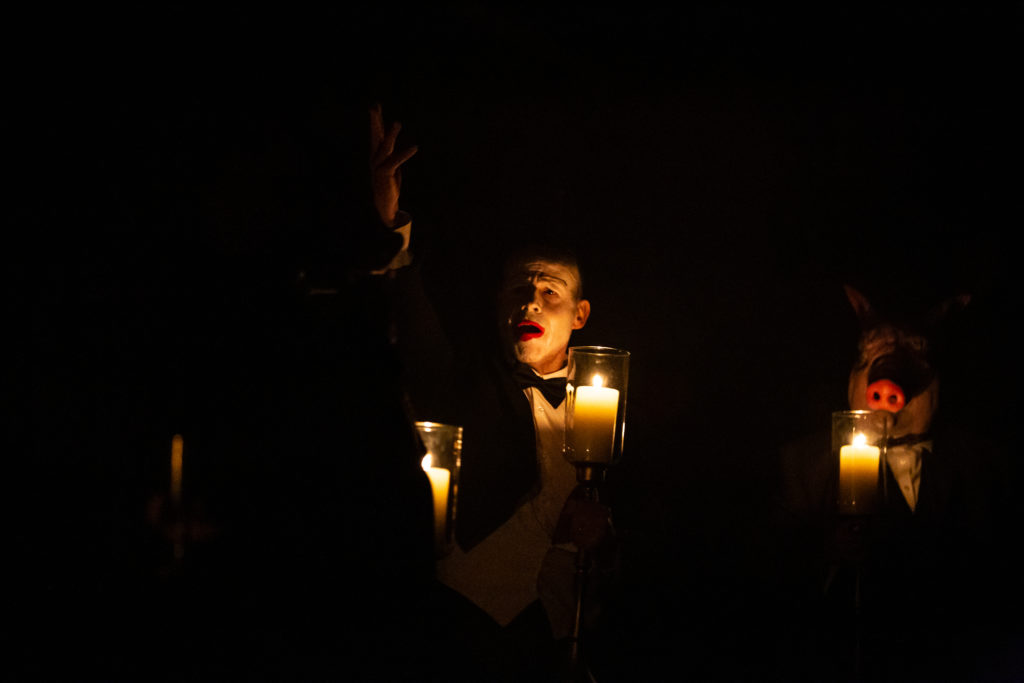
When historians of the future chronicle the last days of Britain, a pig’s head may enjoy its own footnote. Assuming that there are still historians, academic protocols or indeed anything resembling a future. That porker’s head supposedly shared a brief but intimate moment with former premier David Cameron: the alleged Juliet to his Romeo, the Isolde to his Tristan, the roll to his sausage and the blanket to, confusingly, his pig.
Gossip about Cameron’s youthful pig-sticking stuck, because it seemed exactly the kind of thing a hooray with more privilege than perception might indulge in. And as austerity bit and the referendum tumbled us into a fractious hellwad, it was an act that seemed all too exact a metaphor for how the adult Cameron treated the nation. Allegation it may be, but it’s too eye-wateringly perfect. No wonder Danny Dyer could capture Cameron’s velvet-lined retirement as sitting around ‘with his trotters up.’

So our snouts may quiver expectantly when a pig’s head fetches up in a political drama. It serves in Mephisto [A Rhapsody] at London’s Gate Theatre as a symbol of prejudice, ambition and cruelly compromised ethics. The play is based on Klaus Mann’s piercing 1936 novel about an actor pushing his way to prominence as Germany skews ever rightwards.
In the play by French author Samuel Gallet (bristlingly translated by Chris Campbell), Aymeric is an actor in present-day provincial Germany, desperate for stardom, fashionably leftish but open to persuasion. He’s only making fitful waves on stage, but starts making them offstage when he finds a pig’s head in a blue plastic bag at the theatre entrance. With extremism on the rise in the small town – the far-right member of Parliament is visiting when Aymeric bursts in – it appears an act of aggression towards the liberal theatre. Aymeric, looking daggers at a colleague who is caught up in the movement, suggests it’s an inside job.
Later, another head is found. Later still, we see Aymeric shiftily holding a similar crumpled blue plastic bag. Perhaps the outrages are an inside job after all, but enflamed by ambition as much as extremism.
Aymeric lends his voice to a colleague’s pleas for more radical drama (well, radical-ish: Ernst Toller). But his heart is in classic star vehicles – he slavers for Hamlet. Leo Bill (never knowingly underbrilliant) plays Aymeric without concessions to likeability, unlike Klaus Maria Brandaeuer, limber and plausibly charming on film in 1981. Bill’s actor is audaciously schmoozy, mesmerisingly fake – lying through his teeth as if the sheer will to deceive were an index of his desire. His voice skeeters between whine and rant; his gangly, oddly-assorted physicality is already an asset as the audience files in, and Bill sits bopping and foot-jiggling in his seat, a thrum of undirected fervour. When Aymeric first displays the pig’s head – rubbery but weighty – he plops it on a chair and addresses one of Hamlet’s speeches to it. You might think of Yorick’s skull – the most famous prop head in history, surely – except this isn’t a symbol of mortality but of the humanity ebbing away as Aymeric’s career picks up steam. Eyes on the piggy prize, he discards allegiances, friends, lovers, until the directorship of the theatre and a pop at Hamlet are his.
At which point, we wooze into a hallucinatory finale. [Ahead: more pigs and the odd spoiler]. Aymeric is in his Hamlet ruff (as I said, his instincts run trad), but his performance stumbles out of joint. Rather than Hamlet’s ghost, he sees his own dead dad, an alcoholic shambles. Play gives way to nightmare pageant, as he is invited to dine with a group of distinguished figures at the artists’ table. But these artists are all celebrated collaborators with the Reich – Richard Strauss, Wilhelm Furtwängler – and all wear pig masks. Aymeric demurs: but celebrity trumps morality, and he slots in beside them. Ears alert for flattery, snout ready for the trough.
The play is captivatingly layered: painfully direct then slippery enough to make you blush. It denounces racism one minute, prods your complicity the next (Anna-Maria Nabirye, as a black artist, cajoles and reproaches a white-figured audience). It voices the will to protest and the futility of artistic protest. And it isn’t merely one man’s story: director Kirsty Housley casts actors who bite into the mess of their roles – Tamzin Griffin (lush and troubled), Elizabeth Chan (watchful and troubled) and Subika Anwar Khan (sneaky and troubled) all shine. Especially involving is Rebecca Humphries, who shares some gauche with Aymeric and begins a relationship with him, but who is increasingly left behind as he snuffles after adulation. Her smile turns inward, her unease sits on her skin. And eventually Humphries plays Klaus Mann himself – gay, morphine-hooked, a marginalised prophet with daddy issues, left to sink. It’s a sharp bit of double casting.
I was glad to see the production at a matinee, because it ended with daylight entering the space (the discovery of the building’s windows has been a pleasing feature of Ellen MacDougall’s direction of the Gate). It opens a window on the world after being immersed in theatre’s self-reflective world. Basia Bińkowska’s design features a shallow floor in livid red and a mirrored, amber-hued back wall, its central opening fringed with golden tinsel. Another wall behind us adds a mussy reflection, the golden tinsel flaring like flames. It’s glamorous, sure, the scarlet and gilt allure of theatrical. But it’s also a playground for the self-deceiving.
Brandauer ended his Mephisto dancing, losing himself in charm. Bill, less sparingly, is last seen bepigged: it’s an unredemptive reading. Maybe that’s how Cameron will be remembered: unforgiven, ridiculed, a reputation humiliated. Nudge nudge, oink oink.
Photos by Cameron Slater (Gate) and Andrew Parsons/PA (Cameron).
Follow David on Twitter: @mrdavidjays

Leave a Reply